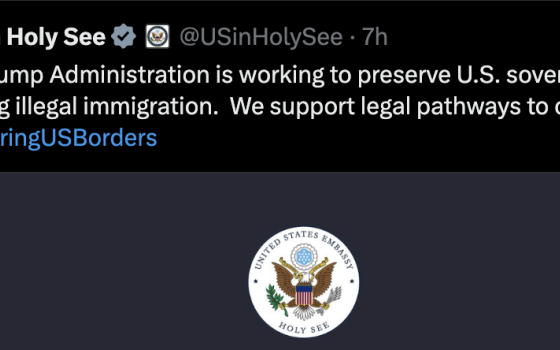Cotonou, Benin
A core motive for Benedict XVI’s trip to Benin this weekend is to honor the late Cardinal Bernardin Gantin, yet it's actually another former Archbishop of Cotonou whose memory may be most helpful in grasping one key feature of African Catholicism: Its brazen disregard of Western notions of church/state separation.
If American Catholics already think their bishops, or the Vatican, sometimes get too involved in politics, the rise of Africa in the global church suggests they probably haven’t seen anything yet.
Archbishop Isidore de Sousa, who led the Cotonou archdiocese, and thus the church in Benin, during the 1990s, is a classic example of the point. During a critical moment in national life in the 1990s, de Sousa in effect served as the country’s supreme authority, helping engineer Benin’s transition form a Marxist dictatorship to a reasonably free and peaceful democracy.
The logic for this boldness is fairly simple. In many societies outside the West, and perhaps especially in Africa, religious bodies are the only meaningful expressions of civil society – the only zones where opposition can take shape, and where the party and the state aren’t supreme. Spiritual leaders, including Catholic clergy, therefore often play a directly political role that would be considered excessive, if not completely inappropriate, by Western standards.
When Benedict XVI visited the Cathedral of Our Lady of Mercy today in Cotonou, he paid honor to de Sousa as a “friend of the truth” who “played a decisive role in your country’s transition to democracy.”
Benin, a West African nation of eight million, is roughly 27 percent Catholic.
Back in 1974, a military ruler named Mathieu Kérékou, who had seized power in a coup two years earlier, declared the country an officially Marxist state under the name “People’s Republic of Benin.” Banks and the oil business were nationalized, and the “People’s Revolutionary Party” was made the lone political institution.
Over the years, Kérékou profiled as a classic African dictator, surrounding himself with apparatchiks drawn from his own northern ethnic group and keeping a tight grip on the reins of power. He survived an attack by mercenaries at the Cotonou airport in January 1977, as well as a two coup attempts in 1988.
By 1989, widespread economic misery fueled protest movements, and in December 1989 Marxism was officially jettisoned as the national ideology, even before the fall of the Berlin Wall. A sort of constitutional convention was convened (formally titled the “National Conference on Invigorating Forces and Renewal of the Nation”), which set out to rebuild Benin from the ground up.
As chair, the conference turned to de Souza, widely perceived as a man of dialogue who could hold the country’s various forces together. After seventeen years of dictatorship and perceptions of ethnic privilege for Kérékou’s kin, de Souza was also seen as the lone moral leader who could help the country avoid a bloodbath of reprisals and settling scores.
With the specific permission of John Paul II, De Souza became the country’s de facto supreme authority during the transitional period, as well as the father of its new constitution. The fact that Benin became the first Africa state where a dictator peacefully surrendered power, and has experienced three democratic transitions in the years since, is due in no small measure to de Souza’s impact.
More broadly, Catholics in Benin, laity and clergy alike, played key roles in the transition. Italian Archbishop Giuseppe Bertello, who currently heads the Vatican City-State and previously served as a papal ambassador in Benin, recently said a key ingredient in the country’s evolution was the capacity of the local church “to form a political class of Catholic democrats.”
Bertello spoke at the presentation of a new book titled “Catholics of Africa: The Birth of Democracy in Benin,” written by a member of the Community of Sant’Egidio and presented at Vatican Radio.
In the recent history of Africa, Benin is hardly an isolated case.
When the war-torn West African nation of Sierre Leone needed someone to head its National Election Commission who could be trusted across party lines to oversee the fairness of balloting, it turned to a former Sister of St. Joseph of Cluny and a devout Catholic activist, Christiana Thorpe. In 1992, the Catholic bishops of Malawi published a celebrated pastoral letter which helped bring down the regime of strongman Hastings Kamuzu Banda, who had ruled the country since its independence in 1964.
De Souza, therefore, looms as a symbol of a broader reality. As Africa sets the tone for Catholicism in the 21st century, that would seem to augur a church that’s steadily more bold about playing a political role.
NCR senior correspondent is traveling with the pope in Benin. Below are a list of stories he has filed so far. Watch the NCR website for updates throughout the weekend.
- Benedict’s Africa plan: Stay spiritual, and stay Catholic, Saturday, November 19, 2001
- On AIDS, Benedict avoids the ‘C’ word, Saturday, November 19, 2001
- In voodoo capital, Benedict blasts 'occultism and evil spirits', Saturday, November 19, 2001
- From a Eurocentric pope, a remarkably African message, Saturday, November 19, 2001
- The political nerve of Catholicism in Africa, Friday, November 18, 2001
- Don't surrender to laws of market, pope says, Friday, November 18, 2001
- Memo to bishops: Think globally on religious freedom, Friday, November 18, 2001
- Transcript from Papal Plane, Friday, November 18, 2001
- From rumba to voodoo, subtext abounds on pope’s Africa trip, Thursday, November 17, 2001


